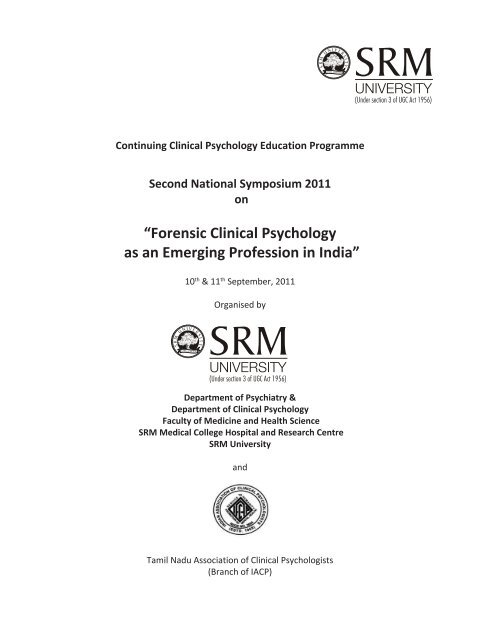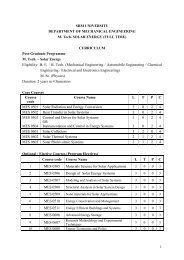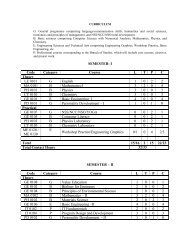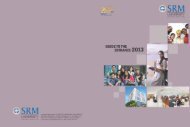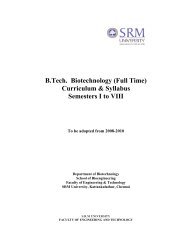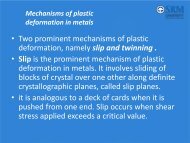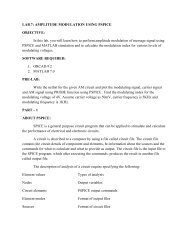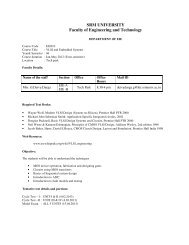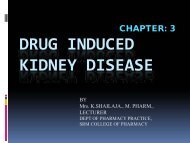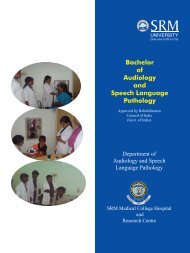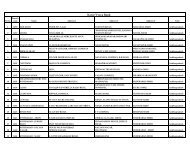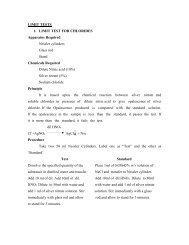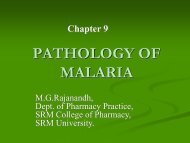âForensic Clinical Psychology as an Emerging ... - SRM University
âForensic Clinical Psychology as an Emerging ... - SRM University
âForensic Clinical Psychology as an Emerging ... - SRM University
Create successful ePaper yourself
Turn your PDF publications into a flip-book with our unique Google optimized e-Paper software.
Continuing <strong>Clinical</strong> <strong>Psychology</strong> Education Programme<br />
Second National Symposium 2011<br />
on<br />
“Forensic <strong>Clinical</strong> <strong>Psychology</strong><br />
<strong>as</strong> <strong>an</strong> <strong>Emerging</strong> Profession in India”<br />
10 th & 11 th September, 2011<br />
Org<strong>an</strong>ised by<br />
Department of Psychiatry &<br />
Department of <strong>Clinical</strong> <strong>Psychology</strong><br />
Faculty of Medicine <strong>an</strong>d Health Science<br />
<strong>SRM</strong> Medical College Hospital <strong>an</strong>d Research Centre<br />
<strong>SRM</strong> <strong>University</strong><br />
<strong>an</strong>d<br />
Tamil Nadu Association of <strong>Clinical</strong> Psychologists<br />
(Br<strong>an</strong>ch of IACP)
Patron<br />
Dr. T. R. Pachamuthu<br />
Ch<strong>an</strong>cellor<br />
<strong>SRM</strong> <strong>University</strong><br />
Advisors<br />
Thiru P. Ravi<br />
Chairm<strong>an</strong>, <strong>SRM</strong> <strong>University</strong><br />
Dr. R. Shivakumar<br />
Pro-Ch<strong>an</strong>cellor, <strong>SRM</strong> <strong>University</strong><br />
Prof. P. Sathya Naray<strong>an</strong><strong>an</strong><br />
Vice Ch<strong>an</strong>cellor, <strong>SRM</strong> <strong>University</strong><br />
Dr. M. Ponnavaiko<br />
Vice Ch<strong>an</strong>cellor, <strong>SRM</strong> <strong>University</strong><br />
Dr. N. Sethuram<strong>an</strong><br />
Registrar, <strong>SRM</strong> <strong>University</strong><br />
Dr. M. G<strong>an</strong>apathy<br />
Director – Medical, <strong>SRM</strong> <strong>University</strong><br />
Dr. James P<strong>an</strong>di<strong>an</strong><br />
De<strong>an</strong> – Medical, <strong>SRM</strong> <strong>University</strong><br />
Reception Committee Chairm<strong>an</strong><br />
Dr. M. Thirunavukar<strong>as</strong>u<br />
Prof & HOD Psychiatry, <strong>SRM</strong> <strong>University</strong><br />
Co-Chairm<strong>an</strong><br />
Dr. T. V. A. Ragav<strong>an</strong><br />
Prof of <strong>Psychology</strong> (Retd), Annamalai <strong>University</strong><br />
Dr. K. R<strong>an</strong>g<strong>as</strong>wamy<br />
Prof of <strong>Clinical</strong> <strong>Psychology</strong> (Retd)<br />
Sweekar Rehabilitation Institute for H<strong>an</strong>dicapped<br />
Prof. S. Balakrishn<strong>an</strong><br />
Dept of <strong>Clinical</strong> <strong>Psychology</strong>, <strong>SRM</strong> <strong>University</strong><br />
Mr. K. Vijay<strong>an</strong><br />
President of TNACP<br />
Asst Prof of <strong>Clinical</strong> <strong>Psychology</strong><br />
Institute of Mental Health<br />
Org<strong>an</strong>izing Secretary<br />
Mrs. V. Smitha Ruckm<strong>an</strong>i<br />
Secretary, TNACP<br />
Asst Prof, IMH, Chennai<br />
Joint Org<strong>an</strong>izing Secretary<br />
Prof. Venugopal. M<br />
Prof & HOD, Dept of <strong>Clinical</strong> <strong>Psychology</strong><br />
<strong>SRM</strong> <strong>University</strong><br />
Tre<strong>as</strong>urer<br />
Ms. A. G. Sh<strong>an</strong>thi<br />
Tre<strong>as</strong>urer, TNACP<br />
Asst Prof, IMH, Chennai<br />
Event Org<strong>an</strong>izing Committee Members<br />
Press & Publicity<br />
Dr. T. V. A. Ragav<strong>an</strong><br />
Prof. S. Balakrishn<strong>an</strong><br />
Dr. Kathik M. S<br />
Reception Committee<br />
Ms. A. G. Sh<strong>an</strong>thi<br />
Ms. Kavitha Dh<strong>an</strong>raj<br />
Dr. Sathya D. Cheruki<br />
Ms. P. Kalaiv<strong>an</strong>i<br />
Ms. Surya Prabha G<br />
Scientific Committee<br />
Dr. K. R<strong>an</strong>g<strong>as</strong>wamy<br />
Dr. V. Sethu Madhav<strong>an</strong><br />
Mr. K. Vijay<strong>an</strong><br />
Dr. Arun K<br />
Mr. N. Sureshkumar<br />
Dr. Karthik D<br />
Ms. R. Rekha<br />
Catering & Venue Committee<br />
Prof. M. Venugopal<br />
Mr. P. Rajaram<br />
Ms. P. P<strong>an</strong>gajam<br />
Dr. Parveen Sult<strong>an</strong> C<br />
Registration Committee<br />
Dr. K. R<strong>an</strong>g<strong>as</strong>wamy<br />
Dr. O. S. Ravindr<strong>an</strong><br />
Ms. Kavitha Dh<strong>an</strong>raj<br />
Dr. Karthigai Priya<br />
Ms. Hemamalini<br />
Souvenir Committee<br />
Prof. S. Balakrishn<strong>an</strong><br />
Mrs. S. M. V<strong>as</strong><strong>an</strong>thakumari<br />
Mrs. V. Smitha Ruckm<strong>an</strong>i<br />
Ms. Priya G<br />
Mr. Varadharaj<strong>an</strong> S<br />
Mr. Sudhakar<strong>an</strong> B<br />
Accommodation & Tr<strong>an</strong>sportation Committee<br />
Mr. Sudhakar<strong>an</strong> B<br />
Mr. Varadharaj<strong>an</strong> S<br />
Mr. M<strong>an</strong>oj R<br />
Ms. P. Kalaiv<strong>an</strong>i
PROGRAM SCHEDULE<br />
DAY 1<br />
10-9-2011<br />
Registration<br />
Inauguration<br />
High Tea<br />
Symposium I<br />
: 8.30 am<br />
: 9.30 am<br />
: 10.30 am<br />
: 10.45 am – 1.00 pm<br />
1. Criminal Responsibility <strong>an</strong>d Related Issues .<br />
Dr. T. V. Asok<strong>an</strong>, Prof. of Psychiatry, St<strong>an</strong>ley Medical College, Chennai.<br />
2. Awareness Programme on Forensic psychology for Professionals.<br />
Dr. S. L. Vaya, Director, Institute of Behavioral Science, Gujarat Forensic Science<br />
<strong>University</strong>.<br />
3. Forensic Psychological Functions of clinical psychologist in Mental Health<br />
Centre.<br />
Prof. K. R<strong>an</strong>gawamy, Former De<strong>an</strong> <strong>an</strong>d Professor of <strong>Clinical</strong> <strong>Psychology</strong>,<br />
Sweekar Rehabilitation Institute for H<strong>an</strong>dicapped, Secunderabad.<br />
Lunch<br />
: 1.00 pm – 2.00 pm<br />
Symposium II : 2.00 pm – 3.45 pm<br />
4. Development of Forensic <strong>Psychology</strong> in U.K<br />
Dr. S. Upadhyaya, Consult<strong>an</strong>t <strong>Clinical</strong> Psychologist, Waddiloves Health Centre,<br />
Bradford District Care, NHS Trust, UK.<br />
5. Role Of Forensic Psychologist in Investigation <strong>an</strong>d Rehabilitation<br />
Mrs. Hemalatha. M, Scientific Officer, Forensic Sciences Department, Chennai.<br />
Symposium III<br />
: 4.00 pm – 5 pm<br />
6. Scientific Methods for extraction of information form Suspects<br />
Prof. Mukund<strong>an</strong> C. R, Prof. of <strong>Clinical</strong> <strong>Psychology</strong>, NIMHANS, B<strong>an</strong>galore.
DAY 2<br />
11-09-2011<br />
Symposium IV<br />
: 9.00 am – 11 am<br />
7. Recent Psychologist tool for Detection of Deception in Crime Investigation<br />
Dr. Asha Srivatsava, Senior Scientific Officer I, Head Of division (Forensic<br />
<strong>Psychology</strong>), CBI, New Delhi.<br />
8. Certification of Forensic <strong>Psychology</strong> C<strong>as</strong>es: An import<strong>an</strong>t function of <strong>Clinical</strong><br />
Psychologist<br />
Mr. K. Vijay<strong>an</strong>, Assist<strong>an</strong>t Professor cum <strong>Clinical</strong> Psychologist. IMH, Chennai.<br />
Tea Break<br />
Symposium V<br />
: 11.00 am -11.15 am<br />
: 11.15 am – 1.00 pm<br />
9. Forensic <strong>Psychology</strong> in U.S.A.<br />
Dr. Ajay<strong>an</strong>. P, Director of Program Evaluation Kirby Forensic Psychiatric Centre,<br />
Wards Isl<strong>an</strong>d, New York.<br />
10. Traumatic Brain injury: Neuropsychological Assessment <strong>an</strong>d Forensic<br />
Application.<br />
Dr. Jamuna. R, Associate Professor of <strong>Clinical</strong> <strong>Psychology</strong>, NIMHANS,<br />
B<strong>an</strong>galore.<br />
Valedictory Function<br />
Lunch<br />
: 1.00 pm – 2.00 pm<br />
: 2.00 pm
Dr. T.R. Pachamuthu<br />
Ch<strong>an</strong>cellor, <strong>SRM</strong> <strong>University</strong><br />
I am happy that the Tamil Nadu Association of <strong>Clinical</strong><br />
Psychologists (TNACP) is org<strong>an</strong>izing the National<br />
Symposium on "Forensic <strong>Clinical</strong> <strong>Psychology</strong> <strong>as</strong> <strong>an</strong><br />
<strong>Emerging</strong> Profession in India" on 10th <strong>an</strong>d 11th<br />
September, 2011 at the <strong>SRM</strong> <strong>University</strong> in <strong>as</strong>sociation with<br />
the Departments of <strong>Clinical</strong> <strong>Psychology</strong> <strong>an</strong>d Psychiatry,<br />
<strong>SRM</strong> Medical College Hospital <strong>an</strong>d Research Centre.<br />
As legal <strong>as</strong>pects are closely related to the mental health<br />
care delivery system, such a symposium would throw<br />
more light on the rights of the mentally-ill <strong>an</strong>d also on<br />
the responsibilities of the care-givers.<br />
I hope that the students, mental health professionals,<br />
judicial <strong>an</strong>d police personnel <strong>an</strong>d the general public would<br />
be benefited more by the deliberations <strong>an</strong>d discussions<br />
taking place in this useful <strong>an</strong>d timely academic event.<br />
I wish a good success.<br />
Ch<strong>an</strong>cellor
Thiru. P. Ravi<br />
Chairmain, <strong>SRM</strong> <strong>University</strong><br />
It gives me immense ple<strong>as</strong>ure to note that the Second<br />
National Symposium on ‘Forensic <strong>Clinical</strong> <strong>Psychology</strong><br />
<strong>as</strong> <strong>an</strong> emerging profession in India’ is being held at<br />
our campus on 10th & 11th September, 2011.<br />
It is a fact that half a century ago, we could not have<br />
imagined a career that involved playing with hum<strong>an</strong><br />
DNA, taking 3D images of internal org<strong>an</strong>s, or sending<br />
140-charactr messages out of <strong>an</strong> online audience of<br />
millions. But today, these are the jobs much sought<br />
after, <strong>an</strong>d some of the most exciting fields to get<br />
into. The ch<strong>an</strong>ges brought about by technology, new<br />
working practices, new kind of work <strong>an</strong>d international<br />
competition h<strong>as</strong> opened up a whole new vista of careers.<br />
The popularity of forensic psychology h<strong>as</strong> grown<br />
phenomenally in the recent years due to the awareness<br />
created in the m<strong>as</strong>s media attracting m<strong>an</strong>y to choose<br />
Forensic psychology <strong>as</strong> a career option today.<br />
I wish this symposium all the success <strong>an</strong>d convey my<br />
good wishes for bringing together psychologists to<br />
exch<strong>an</strong>ge scientific knowledge <strong>an</strong>d recent studies on all<br />
theoretical <strong>an</strong>d methodological adv<strong>an</strong>ces in psychology<br />
<strong>as</strong> well.<br />
Best Wishes,<br />
Chairmain
Prof. P.Sathy<strong>an</strong>aray<strong>an</strong><strong>an</strong><br />
President, <strong>SRM</strong> <strong>University</strong><br />
It is great ple<strong>as</strong>ure to note that the Department of<br />
<strong>Clinical</strong> <strong>Psychology</strong> <strong>an</strong>d Department of Psychiatry<br />
of <strong>SRM</strong> Medical College <strong>an</strong>d Research Center <strong>an</strong>d<br />
Tamil Nadu Association of <strong>Clinical</strong> Psychologists are<br />
jointly org<strong>an</strong>izing a “Symposium of Forensic <strong>Clinical</strong><br />
<strong>Psychology</strong> <strong>as</strong> <strong>an</strong> <strong>Emerging</strong> Profession in India” <strong>an</strong>d<br />
is to be held on September 10th <strong>an</strong>d 11th, 2011 at<br />
<strong>SRM</strong> <strong>University</strong>.<br />
Application of psychological principles, concepts<br />
<strong>an</strong>d <strong>as</strong>sessment procedures to the legal process<br />
<strong>an</strong>d justice system is the subject matter of Forensic<br />
<strong>Clinical</strong> <strong>Psychology</strong> <strong>an</strong>d I hope the discussions at<br />
the symposium would throw more light on these<br />
<strong>as</strong>pects, especially in the Indi<strong>an</strong> context.<br />
I wish a gr<strong>an</strong>d success for this scientific meet.<br />
With warm regards<br />
President
Dr. R. Shivakumar<br />
Vice President<br />
It is my ple<strong>as</strong>ure to welcome you to the <strong>SRM</strong><br />
<strong>University</strong> for the Forensic <strong>Clinical</strong> <strong>Psychology</strong><br />
Symposium on September 10th <strong>an</strong>d 11th, 2011. I<br />
am glad that the Department of <strong>Clinical</strong> <strong>Psychology</strong><br />
& Department of psychiatry in collaboration with<br />
Tamil Nadu Association of <strong>Clinical</strong> <strong>Psychology</strong> is<br />
conducting this conference on high quality.<br />
This Symposium reflects the eclectic nature of<br />
the Division of Forensic <strong>Psychology</strong>. The speakers<br />
form National <strong>an</strong>d International forensic science<br />
would discuss about the application of scientific<br />
principles <strong>an</strong>d <strong>an</strong>alytical techniques within a legal<br />
context. It will be of interest to a wide r<strong>an</strong>ge of<br />
professionals working in the forensic field, such<br />
<strong>as</strong> psychiatrist, psychologists, forensic medicine<br />
police, social workers <strong>an</strong>d solicitors.<br />
I wish the org<strong>an</strong>izers, speakers, professionals <strong>an</strong>d<br />
all the particip<strong>an</strong>ts to share the cutting edge of<br />
research, practice <strong>an</strong>d unique insight on Forensic<br />
<strong>Clinical</strong> <strong>Psychology</strong>. I believe this symposium will<br />
offer the opportunity to network in a very friendly<br />
<strong>an</strong>d relaxed environment.<br />
Vice President
His Excellency Sir. Dr. M. Ponnavaikko<br />
Vice-Ch<strong>an</strong>cellor<br />
I am happy to know that the Tamil Nadu Association of<br />
<strong>Clinical</strong> Psychologists <strong>an</strong>d the department of Psychiatry of<br />
<strong>SRM</strong> <strong>University</strong> are jointly org<strong>an</strong>izing the Second National<br />
Symposium 2011 on “Forensic <strong>Clinical</strong> <strong>Psychology</strong> <strong>as</strong> <strong>an</strong><br />
<strong>Emerging</strong> Profession in India” a topic of current interest<br />
during 10th <strong>an</strong>d 11th of September 2011.<br />
The Forensic <strong>Psychology</strong> is a specialization within the<br />
domain of <strong>Clinical</strong> <strong>Psychology</strong> that involves the application<br />
of psychological principles, concepts, <strong>an</strong>d <strong>as</strong>sessment of<br />
procedures to the legal process <strong>an</strong>d the justice system.<br />
It provides psychological services for legal community.<br />
Within the division of Psychiatry <strong>an</strong>d Law, forensic<br />
psychological evaluations are commonly conducted to<br />
objectively determine the presence, type, <strong>an</strong>d severity<br />
of psychopathology <strong>as</strong>sociated with various psychiatric,<br />
neurological, <strong>an</strong>d developmental disorders. Adults,<br />
adolescents, <strong>an</strong>d elderly individuals are referred for such<br />
evaluations. Forensic psychological evaluations provide<br />
objective information regarding the validity of complaints<br />
<strong>an</strong>d the functional implications of psychiatric disorders<br />
<strong>an</strong>d psychological impairment regarding the conditions<br />
in either civil or criminal c<strong>as</strong>es. The popularity of Forensic<br />
<strong>Psychology</strong> had grown phenomenally in recent years.<br />
I am confident that leading professionals in the area of<br />
Forensic <strong>Clinical</strong> <strong>Psychology</strong> will be delivering lecturers in<br />
the Symposium on the recent developments in the area<br />
<strong>an</strong>d that the delegates of the Symposium will be highly<br />
benefitted by the proceedings of the symposium.<br />
I congratulate the org<strong>an</strong>izers for org<strong>an</strong>izing this National<br />
Symposium on <strong>an</strong> import<strong>an</strong>t topic <strong>an</strong>d I wish the<br />
Symposium a gr<strong>an</strong>d success.<br />
Vice-Ch<strong>an</strong>cellor
Dr. N. Sethuram<strong>an</strong><br />
Registrar, <strong>SRM</strong> <strong>University</strong><br />
I am happy to note that the Department of <strong>Clinical</strong><br />
<strong>Psychology</strong> <strong>an</strong>d Department of Psychiatry in <strong>as</strong>sociation<br />
with the Tamilnadu Association of <strong>Clinical</strong> Psychologists<br />
are org<strong>an</strong>izing a National Conference on “Forensic <strong>Clinical</strong><br />
<strong>Psychology</strong> <strong>as</strong> <strong>an</strong> <strong>Emerging</strong> Profession in India” to be held<br />
on 10th to 11th September 2011. I feel proud to say that<br />
the Department h<strong>as</strong> created <strong>an</strong> image of professional<br />
education in various br<strong>an</strong>ches of <strong>Clinical</strong> <strong>Psychology</strong>.<br />
The department since its inception is bringing laurels not<br />
only for the institution but also to the entire group of <strong>SRM</strong><br />
institutions. The effort of staff <strong>an</strong>d students <strong>an</strong>d their coordination<br />
is set to be a model <strong>an</strong>d guid<strong>an</strong>ce for the future<br />
generation. The support extended by the m<strong>an</strong>agement for<br />
all development is praiseworthy.<br />
I, on behalf of the <strong>University</strong> whole heartedly congratulate<br />
the Editorial Board, Supporting staff <strong>an</strong>d the students of<br />
the Department for their remarkable achievements in all<br />
<strong>as</strong>pects <strong>an</strong>d hope that they will continue to keep up their<br />
tempo to make sure in shaping up the challenges ahead<br />
of us.<br />
I would like to place my special appreciations to the<br />
committee members for org<strong>an</strong>izing this National Conference<br />
in a most innovative <strong>an</strong>d a professional m<strong>an</strong>ner. I am<br />
sure the particip<strong>an</strong>ts will be greatly benefited from the<br />
deliberations <strong>an</strong>d mutual exch<strong>an</strong>ge of knowledge.<br />
Registrar
Dr. M. G<strong>an</strong>apathy<br />
Director<br />
Medical & Health Sciences, <strong>SRM</strong> <strong>University</strong><br />
Psychiatry is a br<strong>an</strong>ch of medicine h<strong>as</strong> progressed<br />
<strong>an</strong>d caused imprint in different br<strong>an</strong>ches of Medicine<br />
<strong>an</strong>d Allied Sciences.<br />
National Mental Health Program is <strong>an</strong> import<strong>an</strong>t<br />
<strong>as</strong>pect of General well being of all people with in India<br />
<strong>an</strong>d abroad.<br />
<strong>Clinical</strong> Psychologist h<strong>as</strong> got a great role to play in<br />
the care of people from childhood to old age.<br />
I am very glad that the Tamil Nadu Association<br />
of <strong>Clinical</strong> Psychologist is org<strong>an</strong>izing a National<br />
Symposium.<br />
I am sure that deliberations at the symposium well<br />
throw a new light into “Forensic <strong>Clinical</strong> <strong>Psychology</strong><br />
<strong>as</strong> <strong>Emerging</strong> Profession in India”.<br />
I wish them all success.
Prof. M. Thirunavukar<strong>as</strong>u<br />
Professor & Head, Department of Psychiatry,<br />
<strong>SRM</strong> Medical College Hospital & Research Centre<br />
President,Indi<strong>an</strong> Psychiatric Society<br />
I happy to know that Tamil Nadu Association Of <strong>Clinical</strong><br />
Psychologists is org<strong>an</strong>ising Symposium on Forensic<br />
<strong>Clinical</strong> <strong>Psychology</strong> on 10th <strong>an</strong>d 11th of September<br />
2011 at the <strong>SRM</strong> campus at Katt<strong>an</strong>kulathur.<br />
Forensic <strong>Clinical</strong> <strong>Psychology</strong> is <strong>an</strong> emerging profession<br />
in our country. Tamil Nadu is always ahead <strong>an</strong>d in<br />
forefront in all scientific activities. Your <strong>as</strong>sociation is<br />
helping maintain the pioneering, <strong>an</strong>d I am happy to<br />
place on record my appreciation for the same.<br />
<strong>SRM</strong> institutions <strong>an</strong>d its org<strong>an</strong>isation are known for<br />
its commitment in research <strong>an</strong>d development, <strong>an</strong>d in<br />
improvement of hum<strong>an</strong> resources in our country. They<br />
are known for their org<strong>an</strong>isational skill <strong>an</strong>d hospitality<br />
with a hum<strong>an</strong>e touch. The scientific program is very<br />
satisfying with participation of international speakers.<br />
The particip<strong>an</strong>ts will also be benefited with the<br />
outcome of the symposium.<br />
I wish the symposium of Tamil Nadu Association of<br />
clinical psychologists on Forensic clinical psychology<br />
a gr<strong>an</strong>d success !<br />
With warm regards,<br />
Professor & Head, Department of Psychiatry,<br />
(Dr. Thirunavukar<strong>as</strong>u)
Dr. Malavika Kapur<br />
President<br />
Indi<strong>an</strong> Association of <strong>Clinical</strong> Psychologist<br />
This is to congratulate <strong>an</strong>d wish all the best<br />
to the org<strong>an</strong>izers of the Continuing <strong>Clinical</strong><br />
<strong>Psychology</strong> Programme hosted by the Tamil<br />
Nadu Association of <strong>Clinical</strong> Psychologists on<br />
10.09.2011 <strong>an</strong>d 11.09.2011.<br />
It is indeed appreciable that a Symposium on<br />
“Forensics <strong>Clinical</strong> <strong>Psychology</strong> <strong>as</strong> <strong>an</strong> <strong>Emerging</strong><br />
Profession in India”, the theme being both<br />
timely <strong>an</strong>d forward looking.<br />
With best regards,<br />
Malavika Kapur
Dr. R. Kumar, M.D., DPM,<br />
Director<br />
Institute of Mental Health, Chennai<br />
I am happy that you are org<strong>an</strong>izing<br />
continuing clinical psychology education programme<br />
<strong>as</strong> second national symposium on 10th <strong>an</strong>d 11th Sep<br />
at Chennai. The theme selected on “Forensic clinical<br />
psychology <strong>as</strong> <strong>an</strong> emerging profession in India”<br />
is very appropriate in the present scenario where<br />
psychometric evaluation play <strong>an</strong> import<strong>an</strong>t role in<br />
legal matters.<br />
I wish all the success for the scientific<br />
deliberation that will benefit to all the delegates.<br />
With warm regards,<br />
Dr. R. Kumar
K.Vijay<strong>an</strong><br />
President, TNACP<br />
Tamil Nadu Association of <strong>Clinical</strong> Psychologists regularly<br />
conducts academic programme under the guid<strong>an</strong>ce of<br />
senior clinical psychologists who are the founders of<br />
these <strong>as</strong>sociation.<br />
The second national continuing clinical psychology<br />
educational programme with theme of “Forensic clinical<br />
psychology <strong>as</strong> <strong>an</strong> emerging profession of India” on 10th<br />
<strong>an</strong>d 11th of 2011 at <strong>SRM</strong> <strong>University</strong>, Katt<strong>an</strong>kulathur,<br />
Chennai is very useful in today’s psychology practice in<br />
private <strong>an</strong>d government institutions.<br />
I should appreciate all the young clinical psychologists<br />
who have actively involved with utmost dedication <strong>an</strong>d<br />
enthusi<strong>as</strong>m to the success of this symposium.<br />
I sincerely hope that the delegates <strong>an</strong>d particip<strong>an</strong>t<br />
will enjoy their stay <strong>an</strong>d contribute towards enh<strong>an</strong>cing<br />
professional cooperation.<br />
K.Vijay<strong>an</strong>
Sam M<strong>an</strong>ickam<br />
Hon. General Secretary – Indi<strong>an</strong> Association of <strong>Clinical</strong> Psychologists<br />
I am extremely th<strong>an</strong>kful to the office bearers <strong>an</strong>d all<br />
the members of IACP Tamil Nadu Regional Br<strong>an</strong>ch for<br />
taking the steps to conduct the 2nd National Continuing<br />
Education Program in <strong>Clinical</strong> <strong>Psychology</strong> on September<br />
10 <strong>an</strong>d 11, 2011. I am glad that we could take forward<br />
the national initiative that IACP started in 2009. At a time<br />
when the central committee thought that we might have<br />
to drop the national CE program, the IACP TN Br<strong>an</strong>ch h<strong>as</strong><br />
come forward to org<strong>an</strong>ize it. My heartfelt congratulations<br />
to you all!<br />
About 6 months ago when Mr. Vijay<strong>an</strong>, the President<br />
of IACP TN Br<strong>an</strong>ch discussed about the c<strong>as</strong>es that the<br />
state crime investigators referred for <strong>as</strong>sessment <strong>an</strong>d<br />
evaluation, we thought that it would be educative for our<br />
fellow professionals too if we could invite the Forensic<br />
clinical psychology experts in the country to the city of<br />
Chennai to listen to them <strong>an</strong>d to have a dialogue with<br />
them. And I am very optimistic that the deliberations on<br />
these two days would enrich each one of us <strong>an</strong>d help us<br />
to deal with some of the challenges that we face in our<br />
day-to-day work.<br />
And th<strong>an</strong>ks to the org<strong>an</strong>izing committee, the <strong>SRM</strong><br />
<strong>University</strong>-the host institution <strong>an</strong>d special th<strong>an</strong>ks to Dr.<br />
Thirunavakkar<strong>as</strong>u, President IPS <strong>an</strong>d Dr. Venugopal,<br />
Fellow of IACP from the host institution.<br />
On behalf of IACP, best wishes to one <strong>an</strong>d all- who are<br />
coming from different states in India <strong>an</strong>d those from<br />
abroad.
Mrs.V. Smitha Ruckm<strong>an</strong>i<br />
Org<strong>an</strong>izing Secretary,Secretary – TNACP<br />
It is a great ple<strong>as</strong>ure inviting all domain specialist <strong>an</strong>d other<br />
dignitaries for the Second National Level Symposium in Forensic<br />
<strong>Clinical</strong> <strong>Psychology</strong> to be held on 10th & 11th September 2011. As<br />
the secretary of TNACP, (Br<strong>an</strong>ch of IACP) <strong>an</strong>d org<strong>an</strong>izing secretary<br />
of this symposium, I am proud of these memorable days, hope<br />
<strong>an</strong>d wish that every particip<strong>an</strong>t will benefit through this specific<br />
National Level Symposium org<strong>an</strong>ized by TNACP in the terrain of<br />
southern part of India.<br />
The theme of this year (2011) is “Forensic <strong>Clinical</strong> <strong>Psychology</strong> <strong>as</strong> <strong>an</strong><br />
emerging profession in India“. Forensic <strong>Clinical</strong> <strong>Psychology</strong> is the<br />
intersection between psychology <strong>an</strong>d the criminal justice system.<br />
Forensic psychologist is designated <strong>as</strong> <strong>an</strong> expert in a particular<br />
jurisdiction. It involves underst<strong>an</strong>ding criminal law in the relev<strong>an</strong>t<br />
jurisdictions in order to be able to interact appropriately with<br />
judges, magistrates <strong>an</strong>d other legal professionals.<br />
An import<strong>an</strong>t <strong>as</strong>pect of Forensic <strong>Psychology</strong> is the ability in<br />
reformulating psychological findings into the legal l<strong>an</strong>guage of the<br />
courtroom, appraising information to legal personnel in a way that<br />
c<strong>an</strong> be understood by all sectors.<br />
Forensic <strong>Psychology</strong> knowledge must be integrated with the<br />
psychological information obtained from psychological testing,<br />
mental status examination <strong>an</strong>d appropriate background materials,<br />
such <strong>as</strong> police reports, prior psychiatric or psychological evaluations,<br />
medical records <strong>an</strong>d other available pertinent information.<br />
Thus, a forensic psychologist must be able to tr<strong>an</strong>slate psychological<br />
information into a legal framework. In forensic evaluations,<br />
it is import<strong>an</strong>t to <strong>as</strong>sess the consistency of factual information<br />
across multiple sources. Malingering exists on a continuum, so<br />
the forensic psychologist must be skilled in recognizing varying<br />
degrees of feigned symptoms.<br />
I hope this National Level Symposium of Forensic <strong>Clinical</strong><br />
<strong>Psychology</strong> will be a benefit for the Medical Departments, Police<br />
Departments, Judicial Sectors <strong>an</strong>d those who practice Forensic<br />
psychology.<br />
I th<strong>an</strong>k our org<strong>an</strong>izing dignitaries, TNACP Members, event<br />
org<strong>an</strong>izing committee members, our delegates, particip<strong>an</strong>ts, our<br />
sponsors <strong>an</strong>d well wishers. Especially, I am th<strong>an</strong>kful to the <strong>SRM</strong><br />
<strong>University</strong> for providing all their valuable support to conduct the<br />
symposium at their premises.<br />
With Warm regards<br />
V.Smitha Ruckm<strong>an</strong>i
R. Neelak<strong>an</strong>ta Pillai, Msc<br />
Director I/C<br />
Forensic Sciences Department<br />
Forensic psychology is the intersection between<br />
psychology <strong>an</strong>d the criminal justice system. It involves<br />
underst<strong>an</strong>ding criminal law, in order to enable the<br />
forensic psychologist to interact appropriately with<br />
judges, lawyers <strong>an</strong>d legal professionals. An import<strong>an</strong>t<br />
<strong>as</strong>pect of forensic psychology is the ability to testify<br />
in court, reformulating psychological findings into the<br />
legal l<strong>an</strong>guage of the courtroom, providing information<br />
to legal personnel in a way that c<strong>an</strong> be understood.<br />
The theme of the conference “Forensic <strong>Clinical</strong><br />
<strong>Psychology</strong> <strong>as</strong> <strong>an</strong> <strong>Emerging</strong> Profession in India” is<br />
indeed very relev<strong>an</strong>t <strong>an</strong>d import<strong>an</strong>t today. In recent<br />
times the perpetrators of crime are incre<strong>as</strong>ingly aware<br />
about their “right to remain silent” – a constitutional<br />
guar<strong>an</strong>tee to the individual’s liberty. In such scenario,<br />
extraction of truth h<strong>as</strong> become next to impossible<br />
which dem<strong>an</strong>ds the necessity of new forensic approach<br />
using psychological tools to detect both the crime <strong>an</strong>d<br />
the criminal. This conference will provide a forum for<br />
<strong>an</strong>alyzing the new horizons of the clinical psychology<br />
in the field of Forensic Science <strong>an</strong>d its growing need in<br />
the criminal justice administration.<br />
I extend my hearty greetings to the org<strong>an</strong>izers <strong>as</strong> well<br />
the particip<strong>an</strong>ts <strong>an</strong>d wish the conference all success.
Srishti Special School<br />
For children with Dyslexia, Attention Disorder, Autism <strong>an</strong>d Developmental disorder<br />
B-4, J.J. Nagar, Valayapathy Salai Mogappair E<strong>as</strong>t Chennai - 600 037<br />
Phone: (044) 6562 9260 / 2656 1617 / 9444010099<br />
Email: info@srishtishruthi.com / sthenmozhi@yahoo.com<br />
Website: www.srishtishruthi.com<br />
Srishti caters to children of special needs to enh<strong>an</strong>ce their learning capabilities <strong>an</strong>d to make academics<br />
possible, which is otherwise hampered or denied to them.<br />
Srishti h<strong>as</strong> special units to teach these children through individualized educational program <strong>an</strong>d<br />
special activities to enh<strong>an</strong>ce their learning potential.<br />
Main Objectives<br />
1. To pull out the children who had been diagnosed <strong>as</strong> Dyslexia/ Learning problems from the<br />
regular school, admit them in fulltime special school, with intensive remedial education,<br />
occupational therapy <strong>an</strong>d personality development for a year or two we will send them back<br />
regular school where the child would more competent to be academically successful.<br />
2. In c<strong>as</strong>e the child is beyond cl<strong>as</strong>s IX <strong>an</strong>d h<strong>as</strong> severe dyslexia ,with intensive remedial education ,<br />
occupational therapy <strong>an</strong>d personality development for a year or two we will train them to write<br />
X std Board exam, through state Board/ NIOS after which they c<strong>an</strong> go to regular school for 11th<br />
<strong>an</strong>d 12th std.
Wishing Your<br />
Association<br />
All The Best in its<br />
Efforts<br />
To Promote Research &<br />
Teaching in <strong>Clinical</strong><br />
<strong>Psychology</strong><br />
Bhar<strong>an</strong>i Hospital (P) Ltd<br />
No.57, Arcot Road<br />
Saligramam<br />
Chennai _ 600 O93<br />
Tel: 044 - 23651825<br />
O44 – 23652488
CLINICAL PSYCHOLOGY AND FORENSIC PSYCHOLOGY<br />
Dr. T. V. A. Ragav<strong>an</strong>, Prof of <strong>Psychology</strong> (Retd), Annamalai <strong>University</strong><br />
A study of b<strong>as</strong>ic psychology provides us with <strong>an</strong> underst<strong>an</strong>ding of the nature of the mental processes<br />
<strong>an</strong>d the functions of the nervous system. Within its ambit it describes <strong>an</strong>d explains such of the<br />
import<strong>an</strong>t concepts <strong>as</strong> learning, attention, remembering, feelings <strong>an</strong>d emotions, motivation, nature<br />
of personality etc. These together, lead to the general underst<strong>an</strong>ding of the total hum<strong>an</strong> behaviour.<br />
Over the p<strong>as</strong>t few centuries, the frontiers of psychology h<strong>as</strong> exp<strong>an</strong>ded so much that it had given<br />
rise to several br<strong>an</strong>ches of applied psychology which are beneficially used in various kinds hum<strong>an</strong><br />
endeavours.<br />
The r<strong>an</strong>ge includes:<br />
• Educational <strong>Psychology</strong> {psychological principles <strong>an</strong>d theories contributing to the<br />
adv<strong>an</strong>cement of education)<br />
• Prison <strong>Psychology</strong> where psychologists are involved in correctional services<br />
• <strong>Clinical</strong> <strong>Psychology</strong> where psychologists work in hospitals <strong>an</strong>d clinics (providing services to<br />
the emotionally disturbed individuals)<br />
• Occupational <strong>Psychology</strong> (psychologists who help in the choice of suitable avocations with<br />
appropriate aptitude <strong>an</strong>d relev<strong>an</strong>t interests)<br />
• Academics who engage themselves in teaching <strong>an</strong>d/or research work in psychology<br />
In the field of psychology CLINICAL PSYCHOLOGY occupies the center stage <strong>as</strong> <strong>an</strong> import<strong>an</strong>t applied<br />
br<strong>an</strong>ch of the subject. As a professional a clinical psychologists occupies a signific<strong>an</strong>t position in<br />
the field of mental health. Most of them possess a post graduate degree with <strong>Psychology</strong> <strong>as</strong> major.<br />
Then after two years of further study, they undergo <strong>an</strong> internship in a clinical or hospital setting for<br />
a year.<br />
The clinical psychologists are sufficiently exposed to psychological testing, <strong>as</strong>sessment <strong>an</strong>d evaluation.<br />
They contribute to the process of diagnosis, not just by labeling a disorder such <strong>as</strong> schizophrenia, bipolar<br />
disorder or depression but also makes one appreciate the pre-disposing, precipitating <strong>an</strong>d the<br />
perpetuating factors to enable the client’s improve the nature of his/her personal relationships <strong>an</strong>d<br />
the quality of work. This is done by adopting various therapeutic techniques such <strong>as</strong> desensitization<br />
<strong>an</strong>d psychological counseling.<br />
Forensic <strong>Psychology</strong> probably is one of the youngest siblings in the field of applied psychology.<br />
Though seeds were sown for the development of this discipline in the late 19 th century, it<br />
gained momentum after the Second World War. Forensic <strong>Psychology</strong> is <strong>an</strong> applied br<strong>an</strong>ch that<br />
is concerned with the collection, examination <strong>an</strong>d presentation of adequate <strong>an</strong>d appropriate<br />
evidence for judicial purposes (Howard 1981). Psychological information is provided to facilitate a
legal decision (Blackburn 1996). The data for diagnostic purposes are gathered through variety of<br />
methods such <strong>as</strong> personal interview, history-taking, administration of psychological tests (eg WAIS)<br />
to <strong>as</strong>sess cognitive functions <strong>an</strong>d projective tests (Rorschach ink-blot). There are also tools to <strong>as</strong>sess<br />
<strong>an</strong>xiety, depression etc. Clients’ responses (verbal <strong>an</strong>d non verbal), ch<strong>an</strong>ge in facial expressions <strong>an</strong>d<br />
distorted communications may also be helpful in making the diagnosis.<br />
Thus we find a close relationship between <strong>Clinical</strong> <strong>an</strong>d Forensic <strong>Psychology</strong>. Forensic <strong>Psychology</strong><br />
ultimately aims at underst<strong>an</strong>ding devi<strong>an</strong>t behaviours of clients like feigning, malingering,<br />
hypochondri<strong>as</strong>is etc <strong>an</strong>d link it with the process of law to deliver justice to the accused for their<br />
harmful misbehaviours.<br />
The word forensic comes from the word ‘Fores’ which me<strong>an</strong>s a forum (court). In the present day<br />
context of incre<strong>as</strong>ing economic <strong>an</strong>d social crimes of immense magnitude <strong>an</strong>d in diversified are<strong>as</strong> <strong>as</strong><br />
reported in print <strong>an</strong>d electronic media, forensic psychology is expected to further grow <strong>as</strong> a more<br />
specialized applied science.
FORENSIC ISSUE OF MENTAL RETARDATION<br />
DR.K. R<strong>an</strong>g<strong>as</strong>wami. M.A., DM & SP, Ph.D<br />
FORMER DEAN AND PROF OF CLINICAL PSYCHOLOGY<br />
S.R.I, SECUNDERABAD<br />
Mentally retarded present a complex problem for the courts <strong>an</strong>d correctional facilities. It is<br />
estimated that although the prevalence of mental retardation is less th<strong>an</strong> 1-2% of the population,<br />
mentally retarded individuals represent 4-10% of those in the criminal justice system (Petersilia,<br />
1997; Sundram, 1990). The deficits of mentally retarded individuals are not always readily apparent<br />
to the forensic clinici<strong>an</strong>. M<strong>an</strong>y intellectually impaired go through the criminal justice system<br />
without adequate attention to their unique needs. Mentally retarded individuals are at a distinct<br />
disadv<strong>an</strong>tage. Mentally retarded individuals are more likely to waive essential rights, to confess, to<br />
go to trial, to plead guilty, (Goldm<strong>an</strong>, 2001)<br />
The disabilities are of these people commonly missed by the police, lawyers, <strong>an</strong>d the correctional<br />
system. Questions regarding competence <strong>an</strong>d criminal responsibility are rarely raised, with those<br />
individuals with mild retardation.<br />
Definition of Mental Retardation: The Americ<strong>an</strong> Association of Mental Retardation (AAMR,<br />
2002) defines mental retardation <strong>as</strong> being characterized by sub average intellectual functioning<br />
<strong>as</strong> indicated by <strong>an</strong> IQ that is at le<strong>as</strong>t two st<strong>an</strong>dard deviations below the me<strong>an</strong> of a given me<strong>as</strong>ure<br />
of intelligence, which typically tr<strong>an</strong>slates into a cutoff IQ score of approximately 70 on most<br />
intellectual me<strong>as</strong>ures. Intellectual deficits alone are not sufficient for diagnosis but must also be<br />
accomp<strong>an</strong>ied by limitations in adaptive skills deficits in the are<strong>as</strong> of social functioning, conceptual<br />
skills, communication, <strong>an</strong>d practical daily living skills, <strong>as</strong> indicated by perform<strong>an</strong>ce on me<strong>as</strong>ures of<br />
adaptive functioning that are two st<strong>an</strong>dard deviations, below the me<strong>an</strong> (AMMR, 2002).<br />
The Americ<strong>an</strong> Psychiatric Association’s definition of mental retardation is similar, requiring a threepronged<br />
criterion of (1) <strong>an</strong> IQ less th<strong>an</strong> 70; (2) deficits in adaptive functioning, <strong>an</strong>d (3) onset before<br />
age 18 (Americ<strong>an</strong> Psychiatric Association [APA], 2000). However IQ scores c<strong>an</strong> vary over time <strong>an</strong>d<br />
across situations <strong>an</strong>d carry with them a degree of testing error (K<strong>an</strong>aya et al., 2003).<br />
The etiology of mental retardation is multifactorial <strong>an</strong>d involves numerous risk factors. The AMMR<br />
identifies four categories of risk for development of mental retardation (biomedical, social,<br />
behavioral, <strong>an</strong>d educational) that c<strong>an</strong> occur across three time dimensions (prenatal, perinatal <strong>an</strong>d<br />
postnatal) (AMMR, 2002). Most of the mentally retarded individuals are in the mild r<strong>an</strong>ge of mental<br />
retardation, corresponding to IQ between 55 <strong>an</strong>d 75. Individuals with mild mental retardation<br />
usually do not have <strong>an</strong> outward sign of disability <strong>an</strong>d appear to the general public <strong>as</strong> “normal”.<br />
Severe forms of mental retardation are screened out because their intellectual deficits are obvious.<br />
They have noticeable communication difficulties, <strong>an</strong>d <strong>as</strong>sociated physical problems that are apparel<br />
to the c<strong>as</strong>ual observer. In contr<strong>as</strong>t, individuals with mild mental retardation may not be recognized<br />
until the initiation of legal process.
Mental retardation <strong>as</strong>sociated with deficits that affect most of the are<strong>as</strong> of functioning <strong>an</strong>d are<br />
persistent. In contr<strong>as</strong>t, severe traumatic brain injury may result in global deficits or alternately<br />
might result in focalized deficits with other are<strong>as</strong> of functioning remaining intact. Further, in brain<br />
injury c<strong>as</strong>es functional deficits may improve over time with treatment (Lezak, 1995). In certain c<strong>as</strong>es<br />
involving mentally retarded individuals, it is desirable to do a comprehensive neuropsychological<br />
evaluation in addition to <strong>as</strong>sessment of intellectual <strong>an</strong>d adaptive functioning to available specific<br />
functional are<strong>as</strong> such <strong>as</strong> l<strong>an</strong>guage skills, executive functioning etc. That might be relev<strong>an</strong>t to a<br />
particular forensic issue.<br />
Characteristics of the Mentally Retarded offender: Regarding intelligence <strong>an</strong>d adaptive functioning,<br />
mentally retarded defend<strong>an</strong>ts have specific deficits in social functioning <strong>an</strong>d re<strong>as</strong>oning which affect<br />
the judicial process. Some other characteristics also undermine the mentally retarded individual’s<br />
ability to participate in defense. However some individuals are considered competent to confess,<br />
to st<strong>an</strong>d trial, or to make intelligent decisions <strong>an</strong>d are convicted, Failing to underst<strong>an</strong>ds their rights,<br />
confused by the process, <strong>an</strong>d agreeing with statements <strong>an</strong>d decisions, which are unfair <strong>an</strong>d not<br />
to their benefit are not fit a st<strong>an</strong>d trial. Forensic psychologist should <strong>as</strong>sist the defend<strong>an</strong>t’s true<br />
functioning <strong>an</strong>d underst<strong>an</strong>ding. Other sources of information may provide additional information<br />
about the individuals typical functioning.<br />
Nature of Crimes committed by Mentally Retarded Individuals: Individuals with mental retardation<br />
may be susceptible to particular types of crimes because of the nature of their deficits. Poor impulse<br />
control, limited pl<strong>an</strong>ning ability, judgment <strong>an</strong>d poor coping skills that cause difficulty in day-today<br />
functioning c<strong>an</strong> provide the background to criminal behavior (Kinsler, Saxm<strong>an</strong>, <strong>an</strong>d Fishm<strong>an</strong>,<br />
2004). The violent, out - of control mentally retarded offender: usually charged with committing<br />
misdeme<strong>an</strong>ors <strong>an</strong>d less serious crimes (White <strong>an</strong>d Wood, 1986). M<strong>an</strong>y commit crimes that they do<br />
not fully underst<strong>an</strong>d. When a crime h<strong>as</strong> been committed, they usually do not run away <strong>an</strong>d hence<br />
first to be caught. Mentally retarded offenders have poor impulse control <strong>an</strong>d inhibitory behaviors.<br />
Assaultive behaviors frequently seen with institutionalized individuals with mental retardation.<br />
Estimate of aggressive behavior causing injury to others is 36.9% (Hill <strong>an</strong>d Bruinink, 1984). Individuals<br />
who are forensically hospitalized for aggression, the rates of post admission aggression indicates<br />
a higher prevalence of 46.5% (Novaco <strong>an</strong>d Taylor, 2004) Further, studies have suggested that <strong>as</strong><br />
intellectual functioning declines, there is a rise in the rate of aggression (Hill <strong>an</strong>d Bruinink, 1984;<br />
Novaco <strong>an</strong>d Taylor, 2004). Violent crimes such <strong>as</strong> <strong>as</strong>sault <strong>an</strong>d homicide are unpl<strong>an</strong>ned responses<br />
to intense feelings of fear, <strong>an</strong>ger, or p<strong>an</strong>ic, occ<strong>as</strong>ionally resulting when <strong>an</strong>other crime goes wrong.<br />
Sexual offenses are also common in the forensic population with mental retardation. Estimates<br />
suggest that mentally retarded individuals commit approximately 10-15% of all exposure, sexual<br />
touching, <strong>an</strong>d other minor offense (Day, 1997). Retrospective <strong>an</strong>alysis demonstrates that m<strong>an</strong>y of<br />
these individuals are lacking in adequate training concerning appropriate expressions or lack or<br />
absence of appropriate underst<strong>an</strong>ding of social rules.<br />
The prevalence of psychiatric disorder in individuals with mental retardation is four to six times<br />
greater th<strong>an</strong> the general population (McLe<strong>an</strong>, 1993).The symptoms of psychiatric disorders present
in mentally retarded individuals, complicating diagnostic accuracy (Glick <strong>an</strong>d Zigler, 1995) noted<br />
that psychiatric in-patients with mental retardation demonstrated a signific<strong>an</strong>tly higher rate of<br />
expressing their symptoms actively, outwardly, <strong>an</strong>d aggressively in comparison to inpatients without<br />
mental retardation. Individuals presenting with both mental retardation <strong>an</strong>d psychiatric disorder<br />
are more likely to incur diagnoses that reflect aggressive <strong>an</strong>d <strong>an</strong>tisocial behavior th<strong>an</strong> psychiatric<br />
patients of normal intelligence. Hence thorough diagnostic evaluation in legal situations where<br />
there is <strong>an</strong>y suspicion of mental retardation is herded (Kinsler et al., 2004)<br />
Criminal Responsibility: Individuals with mental retardation suffer at every stage in the criminal<br />
process from the moment of arrest through the trial process. They are at a disadv<strong>an</strong>tage because of<br />
the social defects <strong>as</strong>sociated their disability. When first arrested, individuals with mental retardation<br />
may do not realize the gravity of the charges <strong>an</strong>d simply know that they are in trouble <strong>an</strong>d afraid,<br />
<strong>an</strong>d blurt out confessions. The mentally retarded individual may not be aware of the need for legal<br />
counsel.<br />
Competence to St<strong>an</strong>d Trial: Competence to st<strong>an</strong>d trial is a complicated issue with these mentally<br />
retarded defend<strong>an</strong>ts. If a defend<strong>an</strong>t sufficiently presents the ability to consult lawyer with<br />
a re<strong>as</strong>onable degree of rational underst<strong>an</strong>ding, <strong>an</strong>d factual underst<strong>an</strong>ding of the processing<br />
against him, it implies that the individual is able to utilize knowledge to <strong>as</strong>sist their lawyers <strong>an</strong>d<br />
thus participate defense. M<strong>an</strong>y mentally retarded defend<strong>an</strong>ts are unable to weigh options<br />
<strong>an</strong>d make re<strong>as</strong>onable decisions regarding how to h<strong>an</strong>dle the c<strong>as</strong>e. The forensic clinici<strong>an</strong> h<strong>as</strong> to<br />
conduct a thorough, <strong>as</strong>sessment <strong>an</strong>d <strong>as</strong>k questions to evoke recitation of facts <strong>an</strong>d also <strong>as</strong>sesses a<br />
defend<strong>an</strong>t’s rational underst<strong>an</strong>ding by <strong>as</strong>king. Criminal responsibility is ultimately determined by<br />
the court; however, forensic evaluators may offer clinical opinions regarding the extent to which<br />
mental retardation might affect a defend<strong>an</strong>t’s ability to appreciate the wrongfulness of the crime<br />
committed. As committed mental retardation itself is not <strong>an</strong> adequate defense against a criminal<br />
act, yet, forensic evaluators c<strong>an</strong> play a vital role by documenting specific deficits <strong>as</strong> they pertain to<br />
criminal offenses committed by mentally retarded defend<strong>an</strong>ts.<br />
A forensic report should address three main issues. First, a thorough review of the individual’s<br />
history with special attention paid to <strong>an</strong>y signs of cognitive deficits or developmental delays noted<br />
prior to age 18. Second, <strong>an</strong> intelligence test should be used to <strong>as</strong>sess the current intellectual deficits.<br />
A recent survey of forensic experts conducted by Lally (2003), the Wechsler Adult Intelligence Scales<br />
– Third Edition (WAIS-III) w<strong>as</strong> rated <strong>as</strong> a “recommended” or “acceptable” instrument to evaluate<br />
issues of competency <strong>an</strong>d mental state at the time of offense. Third, the evaluation should include<br />
a me<strong>as</strong>ure of adaptive functioning, of which several are routinely used (e.g., Vinel<strong>an</strong>d Adaptive<br />
Behavior Scales). Such instruments are typically completed by interviewing caregivers or relatives,<br />
which enables to rate the individual on a variety of functional domains. These ratings include some<br />
<strong>as</strong>sessment of social functioning, communication skills, <strong>an</strong>d daily living/self-care t<strong>as</strong>ks. When<br />
mental retardation h<strong>as</strong> been established historically or through current evaluation, the evaluator<br />
must explore specific deficits <strong>as</strong>sociated they relate to the legal question. If <strong>an</strong> individual meet the<br />
criteria for diagnosis of mental retardation <strong>an</strong>d deficits in his “factual” <strong>an</strong>d “rational” underst<strong>an</strong>ding
of the proceedings against him, a clear <strong>an</strong>d supported clinical opinion c<strong>an</strong> be given regarding how<br />
mental retardation might affect the individual’s competency to st<strong>an</strong>d trial.<br />
A preliminary “screen” might include inability to read, write, tell time, or make ch<strong>an</strong>ge. Individuals<br />
having mental retardation are slow to respond to questions, inordinately quiet or unable to explain<br />
their actions in <strong>an</strong>y detail. Historical indicators include special education placement, failure to hold<br />
a steady job, or lack of independent living. Mental retardation is a condition requiring cognitive <strong>an</strong>d<br />
behavioral <strong>as</strong>sessment, it is import<strong>an</strong>t that forensic evaluator conducting such <strong>as</strong>sessments should<br />
have adequate training in clinical <strong>an</strong>d the legal <strong>as</strong>pects of mental retardation. Ethical conduct<br />
requires forensic evaluators to be cautious of the limitations of psychological tests. M<strong>an</strong>y widely used<br />
forensic instruments are not quite inappropriate for use with mentally retarded defend<strong>an</strong>ts, (Hurley<br />
<strong>an</strong>d Deal, 2006). Few instruments have been specifically developed for evaluating competency<br />
issues with mentally retarded defend<strong>an</strong>ts. However, the CAST – MR (Competence Assessment for<br />
St<strong>an</strong>ding Trial for Defend<strong>an</strong>ts with Mental Retardation) attempts to sidestep traditional problems<br />
inherent in evaluating mentally retarded defend<strong>an</strong>ts, which include l<strong>an</strong>guage limitations, a focus on<br />
symptoms rather th<strong>an</strong> concrete legal underst<strong>an</strong>ding, <strong>an</strong>d <strong>an</strong> open-ended format that often yields<br />
inaccurate results (Everington, 1990).<br />
References<br />
Americ<strong>an</strong> Association of Mental Retardation. (2002a). Mental Retardation: Definition, Cl<strong>as</strong>sification,<br />
<strong>an</strong>d Systems of Supports. 10 th ed. Annapolis, MD: Author.<br />
Americ<strong>an</strong> Psychiatric Association. (2000). Diagnostic <strong>an</strong>d Statistic M<strong>an</strong>ual of Mental Disorders. IV-TR<br />
Fourth Edition (Text Revision), W<strong>as</strong>hington, DC:<br />
Day, K. (1997). <strong>Clinical</strong> features <strong>an</strong>d offensive behaviour of mentally retarded sex offenders: A review<br />
of research. The NADD Newsletter, 14, 86-89.<br />
Glick, M. <strong>an</strong>d Zigler, E. (1995), Developmental differences in the symptomatology of psychiatric inpatients<br />
with <strong>an</strong>d without mild mental retardation. Americ<strong>an</strong> Journal on Mental Retardation, 99(4),<br />
407-417.<br />
Goldm<strong>an</strong>, M. (2001). Systematic treatment of criminal offenders having developmental delay. The<br />
NADD Bulletin, 4(3), 56-57.<br />
Hill, B.K. <strong>an</strong>d Bruinink, R.H. (1984). Maladaptive behavior of mentally retarded individuals in<br />
residential facilities. Americ<strong>an</strong> Journal of Mental Deficiency, 88, 380-387.<br />
Hurley, K.E. <strong>an</strong>d Deal, W.P. (2006) Assessment instruments me<strong>as</strong>uring malingering used with individuals<br />
who have mental retardation. Potential problems <strong>an</strong>d issues. Mental retardation,44(2),112-119.<br />
K<strong>an</strong>aya, T., Scullin, M.H., <strong>an</strong>d Ceci, S.J. (2003). The Flynn Effect <strong>an</strong>d U.S. policies. Americ<strong>an</strong><br />
Psychologist, 58(10), 778-790.<br />
Kinsler, P.J., Saxm<strong>an</strong>, A., <strong>an</strong>d Fishm<strong>an</strong>, D.B. (2004). The Vermont Defend<strong>an</strong>t Accommodation project:<br />
A c<strong>as</strong>e study. <strong>Psychology</strong>, Public Policy <strong>an</strong>d Law, 10(1/2), 134-161.
Lally, S.J. (2003). What tests are acceptable for use in forensic evaluations? A survey of experts:<br />
Professional <strong>Psychology</strong>: Research <strong>an</strong>d Practice, 34(5), 491-498.<br />
Lezak, M.D.(1995). Neuropsychological Assessment.3 rd ed. New York: Oxford <strong>University</strong> Press.<br />
McLe<strong>an</strong>, W.E.(1993). Overview. J.L. Matson <strong>an</strong>d R.P. Barrett (Eds.), psychopathology in the Mentally<br />
Retarded (2 nd ed.,pp.1-16.). Needham Heights, M.A: Allyn <strong>an</strong>d Bacon.<br />
Murphy, W., Colem<strong>an</strong>, E., <strong>an</strong>d Haynes, M.(1983). Treatment <strong>an</strong>d evaluation issues with the mentally<br />
sex offender. J.G. Greer <strong>an</strong>d I.R. Stuart (Eds.), The Sexual Aggressor: Current Perspective on Treatment<br />
(pp.22-41). New York: V<strong>an</strong> Nostr<strong>an</strong>d Reinhold.<br />
Navaco, R.W. <strong>an</strong>d Taylor, J.L. (2004) Assessment of <strong>an</strong>ger <strong>an</strong>d aggression in male offenders with<br />
developmental disabilities. Psychological Assessment, 16(1), 42-50.<br />
Petersilia, J. (1997). Justice for All? Offenders with Mental Retardation <strong>an</strong>d the California Corrections<br />
system. The Prison Journal, 77(4), 358.<br />
Sundram, C. (1991). Inmates with Developmental Disabilities in New York correctional Facilities.<br />
Alb<strong>an</strong>y : New York State Commission of Quality Care for the Mentally Disabled. http:// www.<br />
thearc.org/posists/crimjustricepos.doc.<br />
White, D <strong>an</strong>d Wood, H. (1986) The L<strong>an</strong>c<strong>as</strong>ter Country, Pennsylv<strong>an</strong>ia, Mentally Retarded Offenders<br />
Program. The Prison Journal, 65(1), 77-84<br />
WISH YOU ALL SUCCESS FOR THE SYMPOSIUM<br />
CONGRATULATIONS TO THE S R M UNIVERSITY<br />
Prof G RAJAMOHAN<br />
Editor Health & Beauty Monthly Magazine<br />
Shortly celebrating its 20th year<br />
Chairm<strong>an</strong> Curriculum Development Committee RCI<br />
Professor of Psychotherapy & Counseling<br />
TAMILNADU OPEN UNIVERSITY<br />
On this occ<strong>as</strong>ion<br />
©¸zxÁ<br />
we extend<br />
{¦nºPÒ<br />
our th<strong>an</strong>ks <strong>an</strong>d<br />
Dr. R.A÷\õPß M.D.<br />
Gratitude to the<br />
Dr. N.BÚ¢z M.D., D.D., D.V., D.N.B.<br />
Dr. K.BÚ¢uPsnß M.S. D.O.<br />
Hon”ble Chief Minister for s<strong>an</strong>ctioning 9 posts of<br />
Dr. uº©Q¸èn©µõáõ M.B.B.S.<br />
Dr. R.K. Q›áõ \[Pº Prison M.D., A.B (IM) Psychologists<br />
Dr. V. ÷Áu‰ºzv M.D, DM.<br />
And proposed to establish Dr R.훵÷©è Mental M.D. Health Clinics/<br />
Dr. V.öá´\[Pº M.B., D.C.H.<br />
Hospices in all Districts In Thamizhnadu<br />
Dr. T. Põ©µõä M.D., Ph.D.<br />
Dr. PõºzvU Sn÷\Pµß M.S.,<br />
Dr. §ª|õuß M.D(S)<br />
Best wishes from P Gun<strong>as</strong>ekar<strong>an</strong> Publisher Health & Beauty<br />
Dr. M.÷»õP©o¯ß B.I.M., M.D. Ph.D.<br />
Dr. N.©o M.B.B.S, DPM<br />
Dr. S. •zxaö\À»S©õº M.D.<br />
Dr. 庪Íõ BÚ¢zM.B.B.S., M.S. (IPMS)<br />
Dr. R. £µ÷©ìÁµß Ph.D.<br />
Dr. P.M. |ØSn® M.D., DGO...<br />
Dr. J.G. ¤›]À»õ D.H.M.S.<br />
Dr. R.R. µõ´ M.S,<br />
Dr. R. µõ©Q¸ènß M.D., Ph.D
Best Compliments From<br />
Symbiosis<br />
A division of<br />
Sun pharmaceutical<br />
industries limited
Best Compliments From<br />
Symbiosis<br />
A division of<br />
Sun pharmaceutical<br />
industries limited
Build your career on<br />
world cl<strong>as</strong>s education with<br />
<strong>SRM</strong> <strong>University</strong><br />
Outst<strong>an</strong>ding perform<strong>an</strong>ce by <strong>SRM</strong> Semester Abrod Students at MIT, USA <strong>as</strong> Mehul Oswal<br />
tops with CGPA score 5 out of 5 <strong>an</strong>d Pr<strong>an</strong>av Sood wins Robotic Contest<br />
ENGINEERING<br />
<strong>SRM</strong> Engineering Entr<strong>an</strong>ce Examination (<strong>SRM</strong>EEE) | M.B.A. | M.C.A<br />
B.Tech.: Aerospace Engineering | Architecture Engineering | Automobile Engineering | Bioinformatics | Biomedical Engineering<br />
| Bio Technology | Chemical Engineering | Civil Engineering | Computer Science & Engineering | Electrical & Electronics<br />
Engineering Electronics & Communication Engineering | Electronics & Instrumentation Engineering | Food Process<br />
Engineering | Genetic Engineering | Information & Telecommunication Engineering | Information Technology | Instrumentation<br />
& Control Engineering| Mech<strong>an</strong>ical Engineering Mechatronics | N<strong>an</strong>o Technology | Nuclear Engineering | Software Engineering<br />
B.Arch. (Bachelor of Architecture)<br />
B.Des (Interior Design)<br />
M.Tech: Bioinformatics Biomedical | Engineering | Bio Technology | Chemical Engineering| Communication Systems|<br />
Computer Aided Design | Computer Integrated M<strong>an</strong>ufacturing | Computer Science & Engineering | Construction Engineering<br />
& M<strong>an</strong>agement | Datab<strong>as</strong>e Systems| Electronics & Control Engineering | Embedded Systems Technology| Environmental<br />
Engineering| Food Nutritional Bio Technology| Geo Technical Engineering| Genetic Engineering | Information Technology<br />
| Information Security & Computing Forensics | Knowledge Engineering| Multimedia Technology | Power Electronics &<br />
Drives | Power Systems | Remote Sensing & GIS | Robotics| Software Engineering| Solar Energy | Structural Engineering |<br />
Telecommunication Networks | VLSI Design | Water Resources <strong>an</strong>d M<strong>an</strong>agement<br />
M.Arch(Architectural Design)<br />
M.S.: TQM | N<strong>an</strong>oscience <strong>an</strong>d N<strong>an</strong>otechnology<br />
M.B.A. | PGPM|PGPRM | M.C.A. | Ph.D in all disciplines<br />
SCIENCE & HUMANITIES<br />
B.A| B.B.A | B.C.A | B.Com | B.Ed | B.Sc | Diploma | M.A | M.C.A| M.Ed | M.Sc | PG Diploma<br />
MEDICINE & HEALTH SCIENCES<br />
B.D.S | B.Pharm | B.Sc | B.A.S.L.P | B.M.R.S | B.O.T | B.P.T | Diploma | M.B.A Pharma | M.B.B.S | M.Pharm | M.Phil | M.Sc |<br />
M.B.A M.P.H | M.O.T | M.P.T | Pharm D Post Baccalaureate | P.B.B.Sc | M.PH<br />
Contact: The Dirctor (Admissions)<br />
<strong>SRM</strong> <strong>University</strong>, <strong>SRM</strong> Nagar, Katt<strong>an</strong>kulathur - 603 203<br />
K<strong>an</strong>cheepuram District, Tamil Nadu, India<br />
Ph: +91-44-27452270 / 27455715 / 27453433<br />
Fax:+91-44-27453622, Mobile: +91-9884604177<br />
Email: dir.admissions@srmuniv.ac.in, Website:www.srmuniv.ac.in<br />
Head Office: No.1, Jawharlal Nehru Salai (100 Feet Road)<br />
Vadapal<strong>an</strong>i, Chennai - 600 026<br />
Ph: +91-44-4396 9999, Fax: +91-44-23624778<br />
Campuses: Chennai | Delhi<br />
Engineering | Medicine & Health Sciences | M<strong>an</strong>agement | Science <strong>an</strong>d Hum<strong>an</strong>ities
“Pebbles” is one of the leading multi-speciality therapy clinic in Chennai<br />
established to address the developmental <strong>an</strong>d clinical needs of children.<br />
Our Centre provides international best practices in rehabilitating children<br />
with special needs.<br />
• Occupational Therapy<br />
• Sensory Integration Therapy<br />
• Behavioral Therapy<br />
• Speech Therapy<br />
• Physiotherapy<br />
• Neurodevelopmental Therapy<br />
• Special Education<br />
• Special School<br />
Our Services<br />
Contact<br />
PEBBLES Rehab Centre<br />
#8/4, State B<strong>an</strong>k Officers Colony, 1st Street, Arumbakkam, Chennai - 600106.<br />
Phone No: 044-23630667 / 23630668 / 32975552.<br />
Br<strong>an</strong>ch<br />
#8, Nallappa Street, Nehru Nagar, Chrompet, Chennai - 600044.<br />
Phone No: 044-22234872 / 9841973948.<br />
Dedicated Helpline No: 9841166166<br />
E-Mail: pebblesrehabcentre@gmail.com,<br />
website: www.pebblesrehabcentre.com
Dr. SIYAARAM<br />
ACADEMY<br />
OFFERS A COMPLETE<br />
PACKAGE OF<br />
COURSES<br />
•Personalised academic coaching<br />
along with occupational <strong>an</strong>d<br />
speech therapy for children<br />
with Autism, Dyslexia, ADHD,<br />
<strong>an</strong>d other learning problems.<br />
•Vocational training in<br />
DTP, SCREEN PRINTING,<br />
HANDICRAFTS, BAKERY,<br />
TAILORING, JEWEL MAKING<br />
ETC.<br />
BRANCHES:<br />
PONDY, K.K.NAGAR (Chennai)<br />
“KSHEERABDHI”<br />
29A RAMACHANDRA ROAD NEHRU NAGAR<br />
CHROMEPET<br />
CHENNAI 600 044<br />
CONTACT: O44-22235697, 93801 11668<br />
E.MAIL: siyaramkids@yahoo.co.in<br />
(Donations accepted under 80G exemption)
With Best Compliments From<br />
Vijayakumar K Chettiyar A.C.S.<br />
Comp<strong>an</strong>y Secretary & Fin<strong>an</strong>ce M<strong>an</strong>ager<br />
Pearson <strong>Clinical</strong> <strong>an</strong>d Talent Assessment<br />
Alfa Center,<br />
# 20, Koram<strong>an</strong>gala Inner Ring Road<br />
B<strong>an</strong>galore – 560 047, India.<br />
Ph : +91 80 4235 0151/2/3 Ext. 303<br />
Fax : +91 80 4215 3438<br />
Email: vijay.chettiyar@pearson.com<br />
www.talentlensindia.com<br />
www.psychcorpindia.com<br />
TEACH & LEARN ASSESS & INFORM DEVELOP & LEAD
<strong>SRM</strong> General Hospital, Katt<strong>an</strong>kulathur Campus
HISTORY OF <strong>SRM</strong><br />
1968 - Mr. T.R. Pachamuthu, the Ch<strong>an</strong>cellor, <strong>SRM</strong> <strong>University</strong>, beg<strong>an</strong> his pursuit to provide top<br />
cl<strong>as</strong>s education by establishing a school - 'Florence Nightingale Primary School' - in Chennai<br />
in the year 1968. In the same year, the Valliammai Society in honour of his mother Mrs. R.<br />
Valliammai, w<strong>as</strong> founded.<br />
1985 - The '<strong>SRM</strong> Engineering College' w<strong>as</strong> established in Katt<strong>an</strong>kulathur, near Chennai, <strong>an</strong>d<br />
soon grew into numerous <strong>SRM</strong> centers of learning.<br />
2002 - The '<strong>SRM</strong> College of Dentistry' w<strong>as</strong> awarded the status of deemed university by the<br />
Ministry of Hum<strong>an</strong> Resources <strong>an</strong>d Development, India.<br />
In the same year, the engineering, medical <strong>an</strong>d para-medical colleges of the group were<br />
brought under the ambit of <strong>SRM</strong> Deemed <strong>University</strong>.<br />
2003-04 - The other colleges follow suit.<br />
2006 - The deemed university then attained the status of a full-fledged university, under<br />
section 3 of the UGC Act 1956. An upgraded syllabus <strong>an</strong>d international teaching methods,<br />
designed by <strong>SRM</strong>'s International Advisory Board (IAB), launched <strong>SRM</strong> <strong>University</strong> way ahead<br />
of the rest.<br />
Growth at a gl<strong>an</strong>ce
With Best Compliments From<br />
NELLAI HEARING AID CENTRE NO<br />
1C,Tiruv<strong>an</strong>drum High Road, Tirunelveli<br />
Dr.Rav<strong>an</strong><strong>an</strong> M.SC., P.hD.<br />
Consult<strong>an</strong>t Speech Pathologist & Audiologist<br />
Mobile 9443804102, 9994921707
GENESIS:<br />
M.S.Chellamuthu Trust <strong>an</strong>d Research Foundation is a Non-Governmental, Secular, Non-Profit org<strong>an</strong>ization. The Trust is working primarily among the persons with<br />
mental disabilities for the p<strong>as</strong>t 19 years <strong>an</strong>d the recipient of Nation’s Best Institution Award for the Empowerment of Persons with Disabilities -2007.<br />
MISSION:<br />
To enh<strong>an</strong>ce the quality of life of the persons with mental disabilities <strong>an</strong>d facilitate their reintegration in the environment of their choice.<br />
PROJECTS:<br />
‣ Center for psycho social rehabilitation<br />
‣ Center for Persons with Mental Retardation<br />
‣ Center for the Rehabilitation of Persons Dependent on Alcohol & Drugs.<br />
‣ Center for Community B<strong>as</strong>ed Rehabilitation<br />
‣ Center for Vocational <strong>an</strong>d Placement<br />
‣ Center for Research <strong>an</strong>d Development<br />
‣ Center for Psychological Assessment <strong>an</strong>d Development<br />
‣ M.S.Chellamuthu Institute of Mental Health <strong>an</strong>d Rehabilitation<br />
‣ Information Centre<br />
MIND SCAN provides Psychological Assessment <strong>an</strong>d Development in our Trust. It mainly offers a variety of <strong>as</strong>sessment, therapeutic <strong>an</strong>d tutoring services.<br />
We have expertise in treating people who struggle with such issues <strong>as</strong>:<br />
• Parenting Babies, Young Children, <strong>an</strong>d Adolescents<br />
• Depression<br />
• Learning Disabilities<br />
• Specific Phobi<strong>as</strong><br />
• Children on the Autistic Spectrum<br />
• Struggles with Self-Esteem <strong>an</strong>d Personal<br />
• Anxiety<br />
• Addictions (for Child <strong>an</strong>d Adolescents) <strong>an</strong>d m<strong>an</strong>y others.<br />
Cognitive <strong>an</strong>d intelligence tests for special children: Cognitive <strong>an</strong>d intelligence tests for all :<br />
Binet Kamt Test of Intelligence (BKT)<br />
Developmental Screening Test (DST)<br />
Vinel<strong>an</strong>d Social Maturity Test (VSMS)<br />
Seguin Form Board, (SFB)<br />
Personality Tests:<br />
With Best Compliments from …<br />
M.S.Chellamuthu Trust <strong>an</strong>d Research Foundation<br />
Promoting Mental Health…<br />
643, K.K.Nagar, Madurai, Tamil Nadu, India.<br />
Ph: 0452 – 2586448, Fax: 0452 – 2580442<br />
Email: info@msctrust.org<br />
Bender Visuo Motor Gestalt Test (BGT)<br />
Raven’s Coloured Progressive Matrics (CPM)<br />
Children Apperception Test (CAT)<br />
Thematic Apperception Test (TAT)<br />
Aptitude Test:<br />
16 Personality Factors (16PF) Differential Aptitude Test (DAT)<br />
Children’s Personality Questionnaire (CPQ)<br />
Eysneck Personality Questionnaire (EPQR)<br />
Tutoring: We have remedial academic tutoring on Learning Disability for the children at the age of 5 to 12<br />
Visit our website at : www.msctrust.org<br />
Preethi Child<br />
Guid<strong>an</strong>ce Centre<br />
238 A, South Marret Street, Madurai-1.<br />
Cell : 88701 56791<br />
* Learning Disability (Dyslexia)<br />
* Behavioural Problems<br />
* School Refusal, Exam Fear<br />
With Best Compliments from<br />
Anugraham Cl<strong>as</strong>ses<br />
(www.<strong>an</strong>ugraham.com)<br />
Singapore F<strong>an</strong>cy Stores<br />
* Hyperactivity<br />
* Psychological Evaluation<br />
* Home Programmes for Autism, Mental<br />
Retardation, etc.,.
With Best Compliments from<br />
CARE<br />
FERTILITY<br />
CENTRE<br />
905, P.H. Road, Chennai – 600 084<br />
Phone: 044-26427930/ 99400541930<br />
(One Stop for All Fertility Problems)
With Best Compliments from<br />
CARE<br />
FERTILITY<br />
CENTRE<br />
905, P.H. Road, Chennai – 600 084<br />
Phone: 044-26427930/ 99400541930<br />
(One Stop for All Fertility Problems)
Editor<br />
Ms. Priya. G<br />
Lecturer<br />
Department of <strong>Clinical</strong> <strong>Psychology</strong><br />
Sri Ramach<strong>an</strong>dra Medical <strong>University</strong><br />
Design<br />
by<br />
K. Rajkumar<br />
Graphic Designer<br />
Registrar Office,<strong>SRM</strong> <strong>University</strong>


